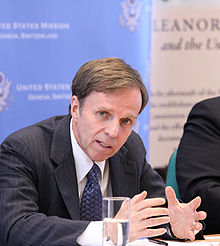
The United States Assistant Secretary of State for Democracy, Human Rights, and Labour Michael Posner concluded his four-day visit to Cairo on Tuesday.
The high-level Washington official met with Egyptian Foreign Minister Mohamed Kamel Amr, President Mohamed Morsi’s foreign affairs advisor Essam Al-Haddad, Minister of Justice Ahmed Mekki, and a number of other high-level government officials, members of civil society, activists, journalists, lawyers, religious figures, and political groups.
Posner said his visit focused on three key areas: The foundation of a sustainable democracy, upcoming parliamentary elections, and security.
“Recognising Egypt’s vital importance in the Middle East and in the world, the US government has made a commitment to supporting Egypt’s economic and political future,” said Posner in the opening statement of his press conference on Tuesday. “In that context, it is more important than ever for the [US] to strengthen our historic relationship through partnership with the Egyptian people, and we intend to do so,” he added.
Posner expressed concern over escalating violence and heightening political polarisation in Egypt. “While we recognise the need for the Egyptian government to take specific steps to build confidence and to address valid concerns, we condemn this violence unequivocally,” he said.
He condemned violent protesters who ignited clashes, but also turned his attention to the police and justice system. With regard to reports of torture and deaths while in police custody, Posner said: “Successful prosecutions have, to date, been rare. This contributes to a climate of impunity and a lack of meaningful accountability for these actions.”
He also highlighted that Egypt’s criminal justice system had failed to identify and punish perpetrators who rape and exhibit violence against women.
“While there are positive aspects of this new [constitution], many Egyptians have questioned both the process by which it was adopted and its content,” he said. “This ongoing debate offers the government the opportunity to reach out widely to develop a consultative process that addresses these differences and helps to bridge the growing divide.”
He acknowledged the Shura Council’s deliberations over a new set of laws regulating demonstrations and NGOs, and urged the Egyptian government to ensure that the laws governing these aspects respect international principles of free assemble and the importance of civil society.
“An important international principle is that NGOs, whether charity or advocacy organisations, are important for holding a government accountable and helping it succeed,” he said.
He urged active engagement in upcoming parliamentary elections, saying the US government would not choose sides or determine the “winners or losers” as a result of the polls. Posner said it was important that Egypt welcome both domestic and international observers to witness the electoral process.
Regarding human rights in Egypt, the assistant secretary said that when he met with Egyptian youth, he recognised that there was a heightened expectation for a more democratic future. “Issues of human rights and democracy are important to the United States, and we will continue raising those issues out of principle,” he said.
“Sustainable democracy is more than just elections. There needs to be rule of law, official accountability and transparency, rights of women, freedom of the press, and many other things.”

